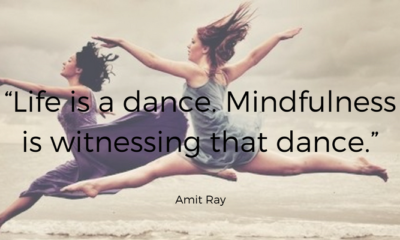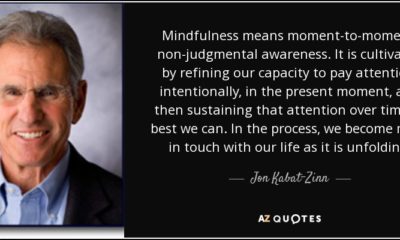anger management
Mindfulness for Anger Management

Mindfulness for Anger Management
by Janette Grant 19th December 2017

How often have we been happily driving down the road feeling peaceful and calm and then a driver pulls in front of us, cutting us off? Or we want to change lane, we signal and then no-one will let us in? Immediately, our peaceful mood changes to anger! We start shouting and getting angrier and then proceed to draw conclusions…He’s an idiot…He was rude…He was in my way…He made me miss my turn. None of this is true, but it’s what our mind immediately assumes! We automatically start to draw conclusions about a situation or the people involved. Anger isn’t necessarily a bad thing – it is a normal emotion – and when we’ve been treated unfairly the emotion can help to rectify the issue. But…blowing up regularly is not good! We all have ways of dealing with anger and some are much healthier than others. But when we unthinkingly snap at people, it can be hurtful to them and us…and actually, quite embarrassing to show that we are unable to hold our temper! And Mindfulness for anger management can teach us how to calm down before the emotion becomes unhealthy.
Mindfulness & the Art of Managing Anger: Meditations on Clearing the Red Mist – this book explores the powerful emotion of toxic anger and teaches us how to control its destructive power through mindfulness.
 These kind of things that make us angry or frustrated can happen daily; a friend hurts our feelings by letting us down; a colleague does something that gives us extra work to do; or we do something thoughtless, which makes us cross with ourself. We then start with all these thoughts about how and why these things happened – we can start swearing and thoughts such as ‘It’s not fair’ and ‘I’m not putting up with this’ etc feed our anger. We worry about the trouble caused and whilst our minds spin off, our frustration, anger and resentment intensifies.
These kind of things that make us angry or frustrated can happen daily; a friend hurts our feelings by letting us down; a colleague does something that gives us extra work to do; or we do something thoughtless, which makes us cross with ourself. We then start with all these thoughts about how and why these things happened – we can start swearing and thoughts such as ‘It’s not fair’ and ‘I’m not putting up with this’ etc feed our anger. We worry about the trouble caused and whilst our minds spin off, our frustration, anger and resentment intensifies.
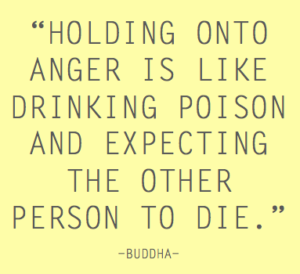
‘Holding onto anger is like drinking poison and expecting the other person to die’ Buddha
The problem is that we attach meaning to an event, but once we recognise that our minds are just creating a story, we can observe our thoughts, stop the story escalating and gently bring ourself back to the present moment. We must realise that thoughts are not facts and once in the present moment, we will understand that the story we have created is causing more pain than the original event.
‘The first drawback of anger is that it destroys your inner peace: the second is that it distorts your view of reality. If you think about this and come to understand that anger is really unhelpful, that it is only destructive, then you can begin to distance yourself from anger’ Dalai Lama
Anger is our inner alarm system telling us that something is wrong, or off balance when an event has not matched with our expectations, our beliefs or our spirit. It can help us in our quest for self-awareness when we look honestly at our anger, but it can become counterproductive when we just ‘lose it’, repress it, or get wrapped up in it and allow it to negatively affect our health and relationships.
If, instead, we could stop for a moment to fully feel the emotion when we first notice our anger, we could put a little space between it and us. How does our body feel when we’re angry? Maybe we feel tightness in our chest, our body tenses and heats up and our breathing becomes shallow. We are practising mindfulness when we stop to notice these sensations in our body and just by accepting and acknowledging these feelings we can loosen their hold over us.

He who angers you controls you
When we are resisting what IS, our anger will build and we continue to carry that anger with us. But when we accept what IS, we will begin to move forward. When we recognise and accept our feelings and simply observe our thoughts, we are in a much better position to make a conscious choice of how best to respond to all the daily annoyances we encounter.
Accepting Mindfulness rather than Anger Management
What were we all told to do in the past when we were angry? Count to 10? Pummel a pillow? Go to an open space and scream? How often did this work though? The problem with the old anger management techniques is that the aim was to control or contain our anger, instead of healing it by resolving the problems our anger has brought to our attention. When we try to manage anger, we’re only basically patching the wound – just temporarily blocking the flow of emotions until the next time we lose it.
It is a fact that anger is an emotional energy that stays in our body until it has run its course. And anger needs to be processed for our emotional health, otherwise it will continue to recycle and resurface. Our anger can teach us what’s important to us, where our sensitivities lie and the limit of our boundaries, but we need to listen to it to learn anything. When we are able to recognise the internal signal or clue that anger is rising, we can switch to a mindset of curiosity and self-investigation about what our anger is saying and then hopefully be able to stop ourself before the anger takes control. We can then choose how to respond to it. These impulse control techniques can make our lives more productive, fulfilling and full of meaningful and loving relationships.
The 1000 Most Powerful Affirmations for Mindfulness & Anger Management – this includes life-changing affirmations for meditation.

Mindfulness for anger management and the impulse control techniques to help it
We first need to learn what triggers our anger and we can use mindfulness to discover this. Our anger triggers could be:
- Situations that make us feel unfairly treated
- Actions that make us feel disrespected, hurt, frustrated or disappointed
- Things that we just simply don’t like, such as irritations and annoyances
We then need to learn how to catch the impulse that leads to our anger. We may not be aware of it, but there is always an impulse that comes before our anger – these impulses are the sensations and thoughts that come after the anger trigger. It may feel like anger and the anger impulse are the same, but this is not the fact. Common anger impulses are:
- Feeling hot
- Feeling tension in our neck
- Raising our voice and changing its tone
- Stonewalling others
- Sighing frequently and loudly
- Feeling threatened
- Feeling fear or jealousy
- Feeling irritable
- Fantasising about revenge or aggression
- Brooding about the anger trigger

‘You will not be punished FOR your anger: you will be punished BY your anger. BUDDHA
After using mindfulness to help us recognise our anger triggers and impulses we now need to use the impulse control techniques. If we can catch and control our anger impulses, it allows us the mental space we need to respond instead of simply reacting to whatever has made us angry. There are two impulse control techniques for our type of anger:
Anger dumpers – the aim here is to get calm and keep the anger in our body instead of unloading it. We should give ourself a time-out, close our eyes and take some slow, deep breaths. Count to 10, or 20 if necessary, whilst breathing in through our nose and out through our mouth. Then we tell ourself to relax and not react and it’s ok to sit with the feelings. If we can imagine a safe, soothing place to retreat to, we should go there.
Anger withholders – this aim is to stay present in our body and not run away. We need to try different containment exercises, such as hugging ourself tight to feel that we’re really there. Or, grip our opposite forearm in each hand and knead our skin. We should keep our eyes open and focus on staying in our body.
As we practice these techniques we must remember that thoughts always comes before feelings. It is important to remember that it’s not what happens to us, but what we think about what happens that decides how we will feel. We always have the choose to stop and explore our anger, learn from it and release it – instead of reacting to it in our normal destructive manner.
Chill Out: Using Meditation and Mindfulness for Anger Management – this book can show us how mindfulness can help us deal with issues that arise to overcome our anger
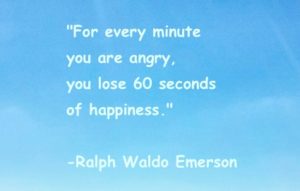
‘For every minute you are angry, you lose 60 seconds of happiness’ Ralph Waldo Emerson
Mindfulness for Anger Management exercise:
- Sit comfortably with your eyes closed. Notice how your body feels on the chair. Take a few deep breaths, completely releasing the breath.
- Remember a time when you felt angry – a little annoyance is better to start with. Envision what happened, feeling the anger again and allow it to get as strong as possible within reason. You may feel other emotions as well, such as sadness and fear, but stay with the feeling of anger if you can.
- Feel in your body where the anger is and explore the feeling. You may want to push it away, but instead try to investigate how it feels. When you notice a sensation, check whether it increases or decreases in intensity.
- Practise bringing compassion to the anger – it is normal – we all experience it. Imagine holding your anger like a mother cradling a newborn – how does it feel when you hold it with tenderness and care?
- Say goodbye to the feeling and slowly bring your attention back to your breath and stay like this for a while, letting your emotions settle into the space of your breath and awareness.
- Once you have finished think about the sensations you noticed in your body. Did they change as you observed them? Could you bring compassion to the anger? What happened when you did that?
When we use mindfulness to understand and overcome anger we will learn to recognise our feelings of anger, instead of allowing them to control us, we will then be well on the way to using mindfulness for anger management, which has to be a good thing for all our relationships!
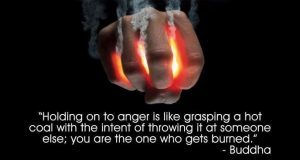
-

 mindfulness9 months ago
mindfulness9 months agoFun Mindfulness exercises for groups
-
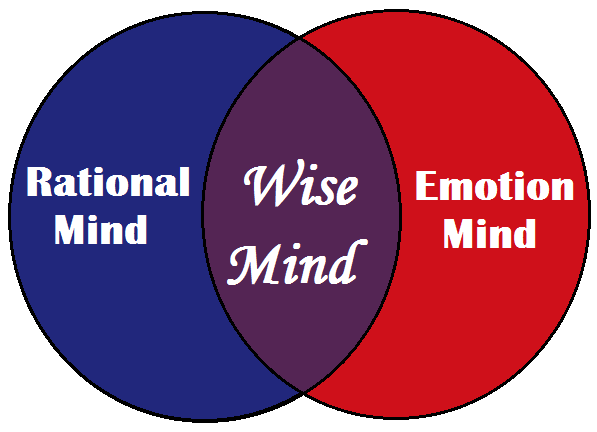
 DBT Mindfulness exercises8 months ago
DBT Mindfulness exercises8 months agoDBT Mindfulness Exercises
-

 mindfulness9 months ago
mindfulness9 months agoChocolate Mindfulness Script
-

 mindfulness8 months ago
mindfulness8 months agoMindfulness of thoughts
-

 mindfulness9 months ago
mindfulness9 months agoMindfulness activities, exercises and techniques for anxiety






